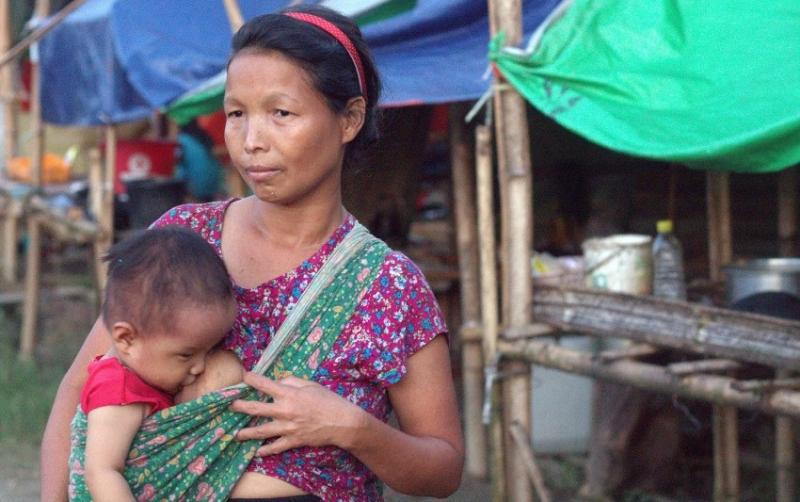by Phyo Thiha Cho
TANAI, Kachin State — Htwal Lya, 22, has had a fever for five days.
Ar Ni, 48, says her child can’t get enough food.
Ree Noi, 36, has had health problems and been in the hospital twice.
The ongoing conflict in northern Myanmar has been brutal for mothers and their children, who are often by themselves, with many men migrating for work or involved in the fighting.
Out of the 50 hospitalized women from the Kachin Baptist Convention camp where Htwal Lya and Ree Noi are staying, more than half are mothers.
According to the UN, since fighting between ethnic armed groups and the Burmese military in northern Myanmar resumed in 2011, almost 90,000 people have been internally displaced in Kachin State. Some 77 percent are women and children.
In Shan State, where there are fewer camps, the percentage is still the same.
Although Aung San Suu Kyi has made peace her new government’s first priority, agreements with forces in the north, such as the Kachin Independence Army, have proved elusive.
Meanwhile, the humanitarian situation only deteriorates.
Malnutrition in the camps is an urgent concern, while the flow of aid is not always guaranteed. Security forces have blocked at least two supply convoys from reaching IDP camps in Kachin this month.
Htwal Lya, Ar Ni and Ree Noi are some of the nearly 1,000 people staying at churches in Tanai Township as a result of new bouts of clashes in the area.
Most of them reached the shelters in the past three months.
Additional camps are popping up in Myitkyina, Bamaw, and Mansi townships in Kachin State.
Local authorities have told churches to help, according to religious leaders. But resources are few.
Father Tu Shan, one of the priests working at the shelters, says fever and diarrhea are common health problems.
But it is often the absence of employment that takes an emotional and physical toll.
Ar Ni says her self-esteem has eroded with no regular work and reliable income.
“I cannot buy sufficient food for my children except to rice gruel,” she said. “My baby does not even get enough breast milk.”
A Lay Mee, 43, is hoping for more assistance.
“The adults cannot buy any food, and cannot feed other nutritious food to the babies,” she said.
Many just want the fighting to end so they can resume their normal lives.
Htwal Lya misses her village in Namkham.
“I felt depressed when I got sick at the camp,” she said, crying. “I just want to go back home.”
This story was originally published by Myanmar Now on August 25, 2017.





Reader Interactions